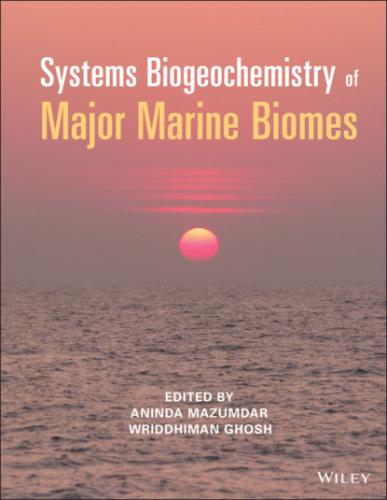10 Banse, K., Naqvi, S.W.A. and Narvekar, P. (2014). Oxygen minimum zone of the open Arabian Sea: variability of oxygen and nitrite from daily to decadal timescales. Biogeosciences 11 (8): 2237–2261. https://doi.org/10.5194/bg‐11‐2237‐2014
11 Banse, K., Naqvi, S.W.A. and Postel, J.R. (2017). A zona incognita surrounds the secondary nitrite maximum in open‐ocean oxygen minimum zones. Deep Sea Research Part I: Oceanographic Research Papers 127: 111–113. https://doi.org/10.1016/j.dsr.2017.07.004
12 Behrenfeld, M.J., O’Malley, R.T., Siegel, D.A. et al. (2006). Climate‐driven trends in contemporary ocean productivity. Nature 444 (7120): 752–755. https://doi.org/10.1038/nature05317
13 Beman, J.M., Shih, J.L. and Popp, B.N. (2013). Nitrite oxidation in the upper water column and oxygen minimum zone of the eastern tropical North Pacific Ocean. The ISME Journal 7 (11): 2192–2205. https://doi.org/10.1038/ismej.2013.96
14 Berner, R.A. (1985). Sulphate reduction, organic matter decomposition and pyrite formation. Philosophical Transactions of the Royal Society of London. Series A, Mathematical and Physical Sciences 315 (1531): 25–38. https://doi.org/10.1098/rsta.1985.0027
15 Berner, R.A. and Westrich, J.T. (1985). Bioturbation and the early diagenesis of carbon and sulfur: American Journal of Science 285: 193–206. https://doi.org/10.2475/ajs.285.3.193
16 Bernhard, J.M. and Bowser, S.S. (2008). Peroxisome proliferation in foraminifera inhabiting the chemocline: an adaptation to reactive oxygen species exposure? 1. Journal of Eukaryotic Microbiology 55 (3): 135–144. https://doi.org/10.1111/j.1550‐7408.2008.0031
17 Bertagnolli, A.D. and Stewart, F.J. (2018). Microbial niches in marine oxygen minimum zones. Nature Reviews Microbiology 16 (12): 723–729. https://doi.org/10.1038/s41579‐018‐0087‐z
18 Bhattacharya, S., Mapder, T., Fernandes, S. et al. (2021). Sedimentation rate and organic matter dynamics shape microbiomes across a continental margin. Biogeosciences, 18, 5203–5222. https://doi.org/10.5194/bg‐18‐5203‐2021
19 Bhattacharya, S., Roy, C., Mandal, S. et al. (2020) Aerobic microbial communities in the sediments of a marine 910 oxygen minimum zone. FEMS Microbiolology Letters 367: fnaa157, 2020. doi: 10.1093/femsle/fnaa157
20 Boetius, A., Ravenschlag, K., Schubert, C.J. et al. (2000). A marine microbial consortium apparently mediating anaerobic oxidation of methane. Nature 407 (6804): 623–626. https://doi.org/10.1038/35036572
21 Bohlen, L., Dale, A.W., Sommer, S. et al. (2011). Benthic nitrogen cycling traversing the Peruvian oxygen minimum zone. Geochimica et Cosmochimica Acta 75 (20): 6094–6111. https://doi.org/10.1016/j.gca.2011.08.010
22 Böning, P., Brumsack, H.J., Böttcher, M.E. et al. (2004). Geochemistry of Peruvian near‐surface sediments. Geochimica et Cosmochimica Acta 68 (21): 4429–4451. https://doi.org/10.1016/j.gca.2004.04.027
23 Bopp, L., Le Quéré, C., Heimann, M. et al. (2002). Climate‐induced oceanic oxygen fluxes: Implications for the contemporary carbon budget. Global Biogeochemical Cycles 16 (2): 6–1. https://doi.org/10.1029/2001GB001445
24 Böttcher, M.E., Thamdrup, B. and Vennemann, T.W. (2001). Oxygen and sulfur isotope fractionation during anaerobic bacterial disproportionation of elemental sulfur. Geochimica et Cosmochimica Acta 65: 1601–1609. https://doi.org/10.1016/S0016‐7037(00)00628‐1
25 Bower, A.S., Johns, W.E., Fratantoni, D.M. et al. (2005). Equilibration and circulation of Red Sea outflow water in the Western Gulf of Aden. Journal of Physical Oceanography 35 (11): 1963–1985. https://doi.org/10.1175/JPO2787.1
26 Bowles, M.W., Mogollón, J.M., Kasten, S. et al. (2014). Global rates of marine sulfate reduction and implications for sub‐sea‐floor metabolic activities. Science 344 (6186): 889–891. https://doi.org/10.1126/science.1249213
27 Boyer, T.P., Antonov, J.I., Baranova, O.K. et al. (2013). World Ocean Database 2013. Silver Spring: NOAA.
28 Breitburg, D., f, L.A., Oschlies, A., Grégoire, M. et al. (2018). Declining oxygen in the global ocean and coastal waters. Science, 359 (6371): eaam7240. https://doi.org/10.1126/science. aam7240
29 Bristow, L.A., Callbeck, C.M., Larsen, M. et al. (2017). N2 production rates limited by nitrite availability in the Bay of Bengal oxygen minimum zone. Nature Geoscience 10 (1): 24–29. https://doi.org/10.1038/NGEO2847
30 Bristow, L.A., Dalsgaard, T., Tiano, L. et al. (2016). Ammonium and nitrite oxidation at nanomolar oxygen concentrations in oxygen minimum zone waters. Proceedings of the National Academy of Sciences 113 (38): 10601–10606. https://doi.org/10.1073/pnas.1600359113
31 Brüchert, V. (1998). Early diagenesis of sulfur in estuarine sediments: the role of sedimentary humic and fulvic acids. Geochimica et Cosmochimica Acta 62 (9): 1567–1586. https://doi.org/10.1016/S0016‐7037(98)00089‐1
32 Brüchert, V., Jørgensen, B.B., Neumann, K. et al. (2003). Regulation of bacterial sulfate reduction and hydrogen sulfide fluxes in the central Namibian coastal upwelling zone. Geochimica et Cosmochimica Acta 67 (23): 4505–4518. https://doi.org/10.1016/S0016‐7037(98)00089‐1
33 Bulow, S.E., Rich, J.J., Naik, H.S. et al. (2010). Denitrification exceeds anammox as a nitrogen loss pathway in the Arabian Sea oxygen minimum zone. Deep Sea Research Part I: Oceanographic Research Papers 57 (3): 384–393. https://doi.org/10.1016/j.dsr.2009.10.014
34 Callbeck, C.M., Lavik, G., Ferdelman, T.G. et al. (2018). Oxygen minimum zone cryptic sulfur cycling sustained by offshore transport of key sulfur oxidizing bacteria. Nature Communications 9 (1): 1–11. https://doi.org/10.1038/s41467‐018‐04041‐x
35 Canfield, D.E. and Thamdrup, B. (1994). The production of 34S‐depleted sulfide during bacterial disproportionation of elemental sulfur. Science 266: 1973–1975. https://doi.org/10.1126/science.11540246
36 Canfield, D.E., Kristensen, E. and Thamdrup, B. (2005). The sulfur cycle. Advances in Marine Biology 48: 313–381. https://doi.org/10.1016/S0065‐2881(05)48009‐8
37 Canfield, D.E., Stewart, F.J., Thamdrup, B. et al. (2010). A cryptic sulfur cycle in oxygen‐minimum–zone waters off the Chilean coast. Science 330
